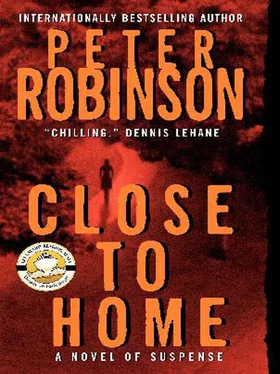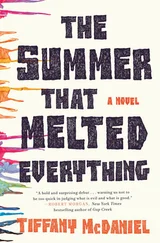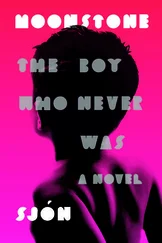“Anything interesting?” he asked.
“Maybe,” said Stefan. “We tried to pin down the exact point on the wall where the body had been dropped over, and it matches the spot where these stones stick out here like steps. Makes climbing easy. Good footholds.”
“I see. It would have taken a bit of strength, though, wouldn’t it?”
“Oh, I don’t know. He might have been a big lad for his age, but he was still only a kid, and pretty skinny.”
“Could one person have done it?”
“Certainly. Anyway, we’ve been looking for scuff marks. It’s also possible that the killer scratched himself climbing up.”
“You’ve found blood on the wall?”
“Minute traces. But hold your horses, Alan. We don’t even know if it’s human blood yet.”
Banks watched the SOCOs taking the wall apart stone by stone and packing it in the back of a van. He wondered what Gristhorpe would think of such destruction. Gristhorpe was building a drystone wall at the back of his house as a hobby. It went nowhere and fenced in nothing. Some of these walls had been standing for centuries without any sort of cement holding them together, but they were far more than mere random piles of rocks. Gristhorpe knew all about the techniques and the patience it took to find just the right stone to fit with the others, and here the men were demolishing it. Still, if it could lead them to Luke’s killer, Banks thought, that was worth a drystone wall or two. He knew Gristhorpe would agree.
“Any chance of footprints?”
Stefan shook his head. “If there was any sort of impression in the grass or the dust, you can be sure it’s gone now. Don’t get your hopes up.”
“Do I ever? Tire tracks?”
“Again, too many, and it’s not a good road surface. But we’re looking. We’ve got a botanist coming up from York, too. There may be some unique plant life by the roadside, especially with it being close to a body of water. You never know. If you find someone with a bit of purple-speckled ragwort sticking to the bottom of his shoe, it just might be your man.”
“Wonderful.” Banks walked back to his car.
“Chief Inspector?” It was one of the reporters, a local man Banks recognized.
“What do you want?” he asked. “We’ve just told you lot all we know at the press conference.”
“Is it true what we’ve been hearing?” the reporter asked.
“What have you been hearing?”
“That it was a botched kidnapping.”
“No comment,” said Banks, muttering, “Shit,” under his breath as he got in his car, turned around in the next lay-by and set off home.
After tracking down a retired detective inspector who had worked out of West End Central and persuading him to talk to her in London the following day, Michelle had left the station and stopped off to rent the video of The Krays on her way home. She hoped the film would at least give her a general picture of their life and times.
She had been living in her riverside flat on Viersen Platz for two months now, but it still felt temporary, just another place she was passing through. Partly it was because she hadn’t unpacked everything – books, dishes, some clothes and other odds and ends – and partly it was the job, of course. Long hours made it difficult to keep house, and most of her meals were eaten on the run.
The flat itself was cozy and pleasant enough. A modern four-story building, part of the Rivergate Centre, it faced south, overlooking the river, got plenty of light for the potted plants she liked to keep on her small balcony, and was so close to the city center as to be practically in the shadow of the cathedral. She didn’t know why she hadn’t settled in more; it was one of the nicest places she had ever lived in, if a bit pricey. But what else did she have to spend her money on? She particularly liked to sit out on the balcony after dark, look at the lights reflected in the slow-moving river and listen to the trains go by. On weekends she could hear blues music from Charters Bar, an old iron barge moored opposite, by Town Bridge, and the customers sometimes made a bit too much noise at closing time, but that was only a minor irritant.
Michelle had no friends to invite for dinner, nor the time or inclination to entertain them, so she hadn’t even bothered to unpack her best chinaware. She had even let such basics as laundry, dusting and ironing slip, and as a consequence her flat had the air of someone who used to maintain a certain level of tidiness and cleanliness but had let things go. Even the bed was unmade since that morning.
She glanced at the answering machine, but no light flashed. It never did. She wondered why she bothered to keep the thing. Work, of course. After a quick blitz on the dishes in the sink and a run around with the Hoover, she felt ready to sit down and watch The Krays . But she was hungry. As usual, there was nothing in the fridge, at least nothing edible, so she went around the corner to the Indian take-away and got some prawn curry and rice. Sitting with a tray on her lap and a bottle of South African Merlot beside her, she pressed the remote and the video began.
When it had finished, Michelle didn’t feel she knew much more about the Kray twins than before it had begun. Yes, theirs was a violent world and you’d better not cross them. Yes, they seemed to have plenty of money and spend most of their time in ritzy clubs. But what exactly did they do? Apart from vague battles with the Maltese and meetings with American gangsters, the exact nature of their businesses was left unexplained. And, as far as the film was concerned, coppers might as well have not even existed.
She turned to the news, still feeling a little queasy from the violence. Or was it from the curry and wine? She didn’t really believe that the Krays had anything to do with Graham Marshall’s murder, no more than she believed Brady and Hindley had, and she could imagine how Shaw would laugh if he heard her suggest such a thing.
If Bill Marshall had any serious criminal aspirations, they hadn’t done him much good. He never got out of the council house, though the Marshalls had bought it for four thousand pounds in 1984.
Perhaps he swore off crime. Michelle had checked subsequent police records and found no further mention of him, so he had gone either straight or uncaught. She would guess at the former, given his standard of living. Graham’s disappearance must have shaken him, then. Maybe he sensed a connection to the world he had been involved in, so he severed all ties. She would have to find time to have an even closer look at the old crime reports, dig out old action books and the notebooks of the detectives involved. But that could wait until after the weekend.
She turned on her computer and tried to put her thoughts and theories into some kind of order, the way she usually did last thing at night, then she played a couple of games of Freecell and lost.
It got dark. Michelle turned off her computer, cleared away the detritus of her lonely dinner, found there wasn’t enough wine left in the bottle worth saving, so topped up her glass. As it so often did around bedtime, the depression seemed to close in on her like a dense fog. She sipped her wine and listened to rain tapping against her window. God, how she missed Melissa, even after all this time. She missed Ted, too, sometimes, but mostly she missed Melissa.
Her thoughts went back to the day it happened. It was a movie that ran in her mind, as if on a constant loop. She wasn’t there – that was a big part of the problem – but she could picture Melissa outside the school gates, her golden curls, little blue dress with the flowers on it, the other kids milling around, vigilant teachers nearby, then Melissa seeing what she thought was her father’s car pulling to a stop across the road, though they always picked her up on her side. Then she pictured Melissa waving, smiling, and, before anyone could stop her, running right out in front of the speeding lorry.
Читать дальше












